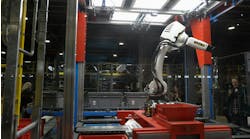Artificial intelligence can actually humanize manufacturing…here’s how
By Pablo Alejo, West Monroe managing director for product experience & engineering lab and Randal Kenworthy, West Monroe senior partner, consumer & industrial products
We’ve all seen the headlines lately. Artificial Intelligence (AI) and how to apply it to business is top of mind for leaders across every industry, particularly manufacturing.
According to a recent study from the Manufacturing Leadership Council, leaders in the industry aren’t quite ready to fully commit to the technology, but still understand the underlying value of AI for manufacturing. In fact, the study found that 57% of manufacturing companies are still experimenting with AI technology to identify how best it can be applied and managed. With that said, nearly all respondents (96%) believe that AI investment by companies in the manufacturing industry will increase by 2023.
With a vast amount of industrial available data that is difficult to sort through and determine how to use, we have an opportunity to leverage AI to help us expand our thinking. In the case of manufacturing, there’s not a single element of the industry that won’t be affected and improved by generative AI.
Creating opportunities in manufacturing
AI is bound to have a profound impact on the manufacturing industry—larger than mobile phones or cloud technology—from the value chain to day-to-day operations to the technology being used. The examples cited below are along the value chain—product design and thought sales. There are also “back office” functions that AI will support, like finance, IT, etc.
The manufacturing industry is leveraging AI in several ways:
· Product innovation and design: AI-driven generative-design tools can help engineers create and optimize designs for manufacturing processes, considering factors like material usage, strength and weight. These tools can generate multiple design options based on specified constraints and performance criteria.
· Smart products: Physical objects with computing capabilities can interact with other devices and systems via a network to collect, process, and transmit data using sensors, processors and communication technologies to offer improved efficiency, predictive maintenance, and remote monitoring. This enhances the customer experience and generates new revenue streams through subscription services, data monetization, and affiliate marketing.
· Smart manufacturing: Generative AI technology can be integrated with IoT devices and sensors to monitor the condition of equipment in real-time. By analyzing data from these sources, AI can predict equipment failures and suggest maintenance activities, reducing unplanned downtime and improving overall equipment efficiency. In fact, we just completed a project with a private-equity firm that was looking to purchase a manufacturing automation-services company. As part of their diligence, we assessed the potential for GenAI, which estimated a 30% programming efficiency gain for PLC/manufacturing-line software programmers.
· Supply chain management: AI can optimize supply chain processes by predicting demand, managing inventory, and optimizing logistics. Generative AI technology can also facilitate communication between suppliers, manufacturers and customers, helping to coordinate activities and resolve issues.
· Sales and service: By leveraging AI, manufacturers can offer personalized and customized products at scale. Generative AI, including ChatGPT, can help in understanding customer requirements and generating custom designs based on buyer preferences.
Changing the manufacturing workforce
Generative AI will likely have two major implications for the manufacturing workforce: it will first increase the productivity of specific jobs and it will free up time to create new ones. Jobs that include repetitive tasks and minimal training or education (i.e. assembly line work) will likely be replaced by AI, which can perform those same tasks more efficiently and accurately than humans.
For example, we recently partnered with a leading beverage manufacturer to keep up with increasing customer demand for their hard seltzers. By implementing a roadmap for them to become a digital shopfloor, enabling data-driven manufacturing operations, the company is now projecting a 5-10% labor productivity improvement and an 18% capacity-utilization increase, which will lead to $36 million revenue annually over five years.
As AI and automation take over routine tasks, there will be a growing demand for high-skill jobs, such as engineers, data scientists and software developers to develop, maintain and improve AI systems. New jobs will be created and some existing jobs in manufacturing will evolve, as workers adapt to new technologies that require human skills like creativity, problem-solving and empathy.
Integrating AI into manufacturing
While many leaders are itching to get into AI, it’s important to consider two initial steps: ground yourself in what AI is (and isn’t) and start small.
Ensuring you and the other key stakeholders within an organization understand the technology and what it can and cannot do is key to kicking off an AI program. Having that knowledge, and setting clear goals and metrics to measure progress sets up the project for success and continual optimization along the way. Testing and learning are key to creating a functional program that will deliver real business value.



